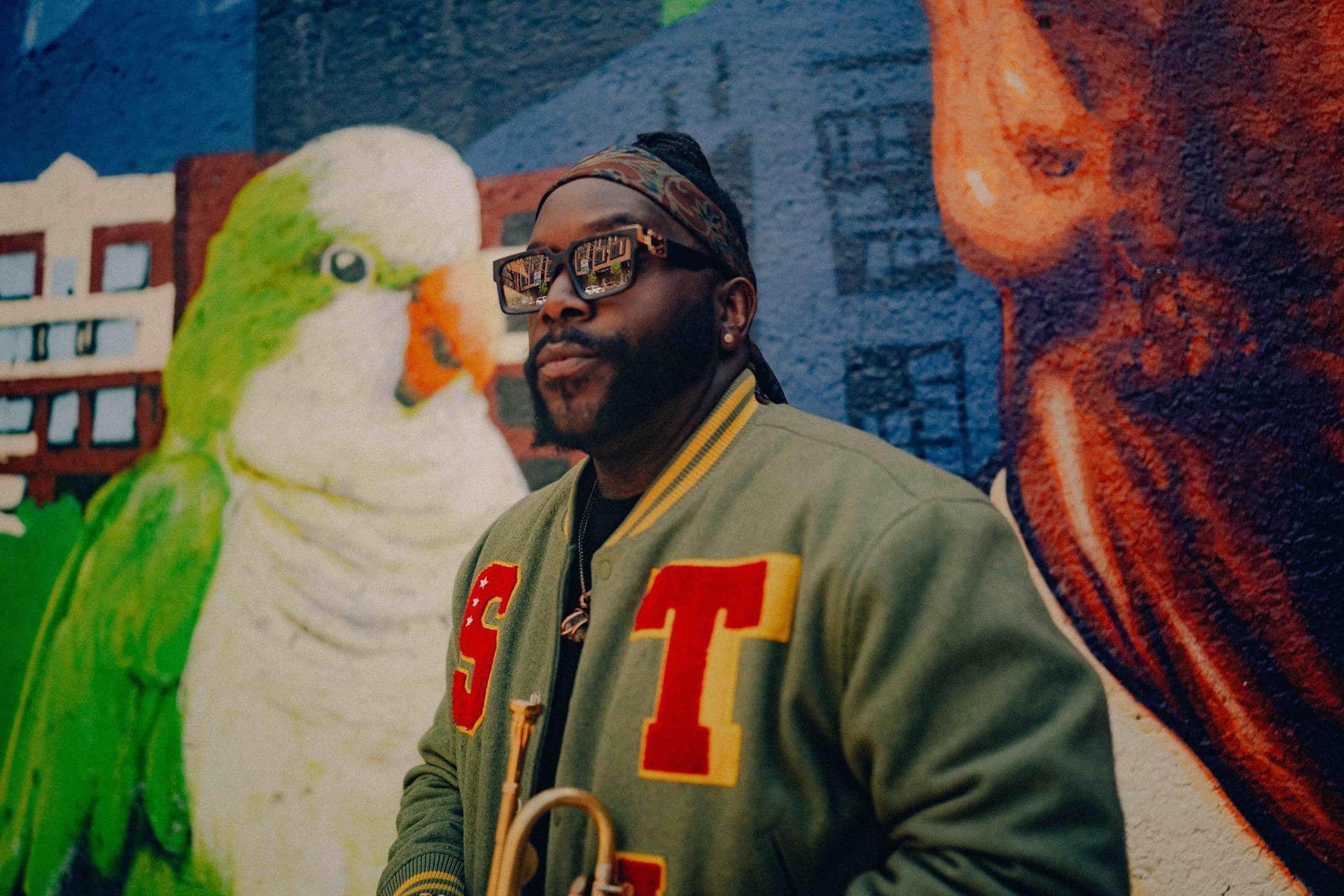The following is jazz journalist Morgan Enos’ interview with trumpeter, composer and bandleader Marquis Hill.
Hill’s new album, Composers Collective: Beyond the Jukebox, was released 30 August. It features Hill’s core quintet: vibraphonist Joel Ross; pianist Michael King; bassist Junius Paul; and drummer Corey Fonville, as well as guests – pianist Gerald Clayton; drummer Makaya McCraven; guitarist Jeff Parker; alto saxophonists Josh Johnson and Caroline Davis; and vocalists Samora Pinderhughes, Manasseh, and Christie Dashiell.
Hill has a plethora of U.S. tour dates coming up throughout 2024. Links to his album, website, and tour dates can be found at the end of this article.
As in many genres, jazz’s core figures are almost invariably idiosyncratic. As a top practitioner, Marquis Hill follows suit. On his latest project, he attracted others.
“Charlie Parker, Miles, Roy Hargrove, rest in peace,” Hill comments. “You can hear how a person lives by the way they play a ballad, by the way they play the blues. You can hear the difference between someone who went to a university, and practised in the practice room for hours upon hours, but didn’t necessarily have life experiences.
“So, our personalities and life experiences come out through our individual voices,” he continues. “That’s an important aspect to emphasise in this music.”
This value goes hand in hand with another core tenet of this new album: in this artform, a lateral, peer-to-peer repertoire goes a long way. Read on for Hill’s viewpoint on the matter, and more.
UK Jazz News: In the press release for Composers Collective, you bemoan a decline in “playing other artists’ compositions”, remembering when Dexter Gordon would record a Lee Morgan tune, or Hubbard a Shorter. In your estimation, what’s undermined this tradition?
Marquis Hill: I’m still analysing and thinking about that, but my natural inclination is toward the involvement of labels, and wanting to own certain rights.
It just kind of faded away. I remember texting with Nicholas Payton about this a little bit. In the ‘50s and ‘60s, it really was a thing. You would have dozens of recordings where cats are playing a Gigi Gryce composition, for instance “Minority,” this beautiful tune.
This project was my effort to highlight that, and bring that back into the space of jazz. I was also in a space of wanting to challenge myself.
I have made many records where I play my original compositions, and I wanted to put myself in an uncomfortable situation, where I had music sent by many different composers: How can I create a cohesive project, and superimpose my sound over this music to make it sound like Marquis Hill?
UKJN: Can you talk about the concept of your quintet?
MH: Openness is the word that comes to mind. This is an ensemble of musicians who are completely open.
Onstage, we’re spiritually and musically naked, and it takes that type of vulnerability to truly create the type of music that I want to create. You hear five individuals pouring their individuality into this music, and I believe it comes across very well.
UKJN: These are top-shelf guests: [pianist] Gerald Clayton, [drummer] Makaya McCraven, [guitarist] Jeff Parker, [saxophonist] Caroline Davis.
MH: I always use the term “Iron sharpens iron.” So, I like to collaborate and play with musicians who I have a certain reverence for, musicians and composers that I look up to.
To me, Gerald Clayton is one of the most prodigious composers of his generation. Of course, he’s an amazing improviser and composer, but what I really learned from him is that it’s not about the individual solo; it’s not the individual track. It’s about the entirety of the project, from track one to the final track.
That’s something that I’ve implemented into the creation of my music; it’s a selfless type of thing. It’s not about who has the most fiery solo, or which track is the hardest: how does the entire project flow, and which statement is being made over an entire listen?
I met Caroline Davis in Chicago – another amazing composer and improviser. What I love about her is her individuality. You can hear that she studied the history of this music, but when you hear Caroline play, you’re hearing Caroline.
I love artists and musicians like that. Joel Ross [is another perfect example]. They bring this component of individuality.
In jazz, due to higher education, there’s a lot of emphasis on transcription, and [emulating] the sounds of the ‘50s and ‘60s. That’s an important part of the music, but I feel the ultimate goal is to create your own language and voice, and add to what’s already been laid down. The guests and artists and composers that I connected with for this project understand this concept.
LINKS:


